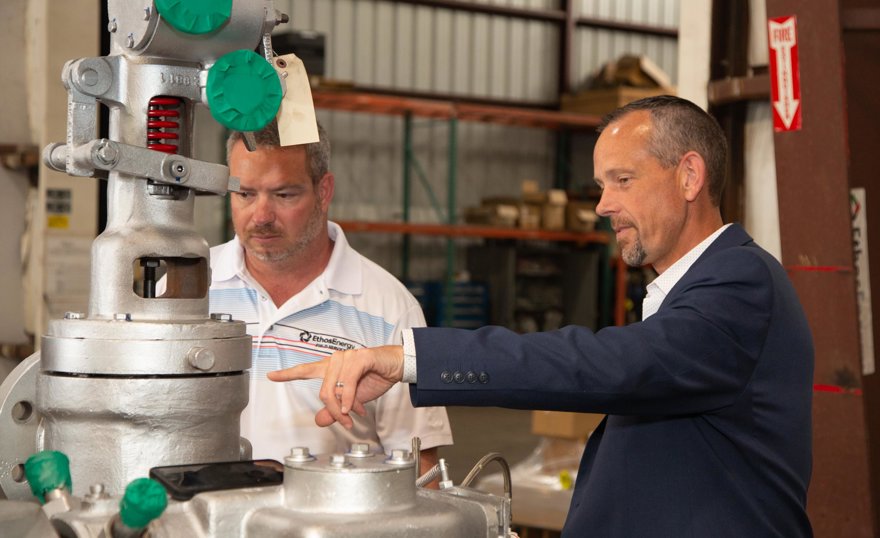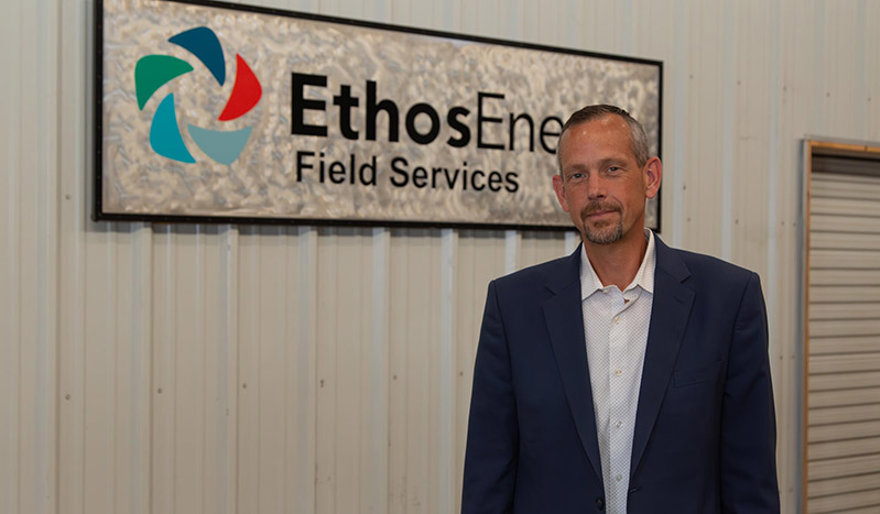Interview with EthosEnergy’s VP of Union Field Services
- Date
- May 03, 2023
- Category
- Views

Catching up with EthosEnergy’s Vice President of Union Field Services, Eric Sielaff: 25 years a millwright
Eric Sielaff is a man with turbomachinery field services in the blood. Now in his 25th year in the profession, EthosEnergy’s Vice President of Union Field Services is a fourth-generation millwright.
With a career that has seen him hold union and contractor roles managing and leading outages, creating and developing training and recruitment programs, and overseeing and directing all union field services, who could be better placed to give an in-depth take on the trade?
We sat down with Eric during a break from his busy schedule of leading our UFS team and training for another Ironman Triathlon. In a fascinating discussion, Eric gave us his thoughts on recent trends in field services, how the millwright trade has changed over the years, and the value our team can bring to a client’s operations.
Millwright marathon man
Eric is used to running distances of 26 miles and more. But what does his journey from union millwright to operational leader look like?
“I started out as an apprentice at 18 years old and worked my way up from there – from apprentice to journeyman to foreman. I then started setting my sights on bigger things – general foreman, superintendent – and got myself into management roles.”
As Eric explains, he’s a millwright by trade with a unique perspective:
“I’ve worked on the union side and now I work on the contract management side. So I have a well-rounded view of the business.”
Industrial mechanics
But for those who are less familiar with turbomachinery field services, how would Eric describe the millwright profession?
“The best way to put it is we are industrial mechanics,” Eric explains. “We do the installation of equipment, we do alignment, we do grouting services, welding, fabrication, and fit-up.”
And one of the specialties of millwright labor is they work in tolerances of thousandths of an inch, if not better.
“We’re constantly using precision equipment to read, to gauge, to align. When we’re working in tolerances of sometimes microns, that takes quite a bit of training. It’s a unique trade, a skilled trade, and there are a lot of nuances that come with it.”

Specialist training at the drop of a hat
As Eric mentioned, our millwrights go through extensive training. What’s involved?
“We use resources such as the Houston Area Safety Council. They administer our safety training and we also use them for other specific training,” Eric says. “When it comes to general training, we partner with the United Brotherhood of Carpenters. We also leverage the millwright apprenticeship programs throughout all the locals.”
And if a client has a specific task-oriented requirement, we can upskill our millwrights in-house at lightning speed.
“We’re very local so we can bring them in, even if they’re on the job site. It’s something we can do at the drop of a hat.”
Outages year-round
What recent trends has Eric seen in union field services?
“There was a lot of maintenance put off in the past because of budget constraints and COVID,” says Eric, who sees the pandemic as still having a big impact. “Critical maintenance activities that were put off during that time are now raising their heads. There are a lot more emergency outages. There’s constant work. Where before you could really go by fall and spring for outages, now it’s year-round.”
And clients rely on us to keep their plants running.
“It’s really become a ‘just-in-time’ industry. If you have to shut your plant down, there’s a lot of money involved. So uptime is very important.”
Flexing on and off
A key benefit for clients is our flexibility.
“We can flex on and off,” Eric says. “One day we can have 30 millwrights on the job, but if the workload doesn’t permit, we can flex that workforce down to 10 millwrights the next day for example.”
And two industries that particularly benefit from contract labor are the power and petrochemical industries. Why is that?
“There is a need because of the overwhelming maintenance needs,” explains Eric. “Either their in-house employees have retired or they don’t have enough staff. We’re able to supplement that with millwright labor.”
But it’s not just routine maintenance we can help with.
“We can also do their turnarounds. They don’t have labor in-house to take care of the big outages. They can do some of the daily maintenance but we come in and we specialize in taking that turbine apart and rebuilding it, or working on the compressor.”

A changed profession
According to Eric, the millwright trade has completely changed from when his great-grandfather worked in it, and even from when Eric was an apprentice. In what ways?
1. Technology
“When I grew up in the field, we used a torch. Now, everybody uses cut-off wheels. We have iPads on the job sites, and we have laser alignment tools that have drastically improved efficiency. So the tools have changed and the training has changed.”
But Eric says it’s important not to lose knowledge of the old ways.
“It’s about keeping familiarity with the tools that created the trade, passing on to the next generation the skills we learned.”
2. Interactions
“It’s how you deal with people, and the UBC and companies in general have really recognized this. There are courses out there, like collaborative leadership. You learn how to lead positively and how to deal with different types of emotions. Not everyone learns the same way. So we’re just really driving our teams to be aware of who’s on their team and how they interact with them.”
A friend in your time of need
Finally, what differentiates our UFS team?
1. Tenure
A lot of our millwrights have been with us for quite some time, and Eric points out that we’ve been backfilling roles organically.
“They understand our commitments, our behaviors, our roles, and responsibilities. We like to grow and promote from within.”
2. Proximity
● Proximity to job sites: “We’re local and we can typically mobilize anywhere in the US within eight hours with tooling, vehicles, and people.”
● And proximity to our supervisors: “Our field managers spend a lot of time in the field. Meeting with the teams and going over the jobs. Meeting with customers and having that face time, which allows them to create relationships.”
3. Our all-encompassing offering
We can offer clients a one-stop shop.
“If we notice there’s something that needs to be done or there’s a component that needs to be fabricated or replaced, we can offer the services of one of our shops around the country. Not many contractors have that offering.”
As Eric puts it, “We try to stand out by being local, being available, and being that friend to the customer in their time of need.”
Read more about EthosEnergy Field Services
-
Field Services
Our turbomachinery field services and power plant service teams provide the personnel and hands-on expertise to deliver on-site
-
Gas turbines down at 3 different plants
Read our case study on how our Field Services team supported 3 emergent outages and 3 different sites for a single client, all within a single outage season
